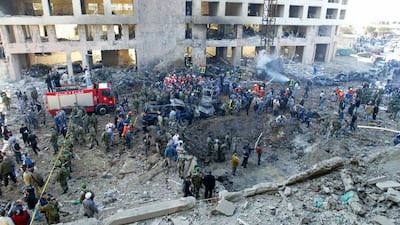A special UN court set up to investigate the murder of former Lebanese Prime Minister Rafik Hariri has run out of money, it was reported on Tuesday.
This could jeopardise an imminent trial in one of the most charged investigations in the country’s history.
The nation's economic crisis has taken its toll on the Special Tribunal for Lebanon, set up in 2007 by the UN Security Council to investigate the bombing that killed former Prime Minister Hariri and 21 others in 2005.
Last year the court, based in The Hague, convicted former Hezbollah member Salim Jamil Ayyash of the bombing in absentia. A further trial for Ayyash, who is tied to a string of other assassinations between 2004 and 2005, is imminent.
Ayyash's whereabouts are unknown, though the US has issued a $10 million bounty for information leading to his arrest.
The tribunal’s mandate was extended in February, yet the Lebanese government, which should contribute 49 per cent of the court’s operating budget, has been unable to fund its share this year. The remainder comes from the UN’s general budget and donors.
With Lebanon unable to meet its financial commitments, the tribunal is frantically looking for funds from elsewhere, yet without success.
The court’s spokesman Wajed Ramadan told Reuters: "The Special Tribunal for Lebanon is in a very concerning financial position.
"No decision has yet been taken on judicial proceedings and there are intense fundraising efforts going on to find a solution."
Those involved in the tribunal, which had a budget last year of $67 million, said that aborting the tribunal would be giving a free pass to the perpetrators of the crimes.
"If you abort the tribunal, if you abort this case, you are giving a free gift to the perpetrators and to those who do not want justice to take place," Nidal Jurdi, a lawyer for the victims, told Reuters.
Nadim Shehadi, Executive Director of the Lebanese American University in New York, who has followed the tribunal closely since its inception, said for it to fold now would send an alarming message.
“What the Lebanese asked for in 2005 when there were demonstrations after Hariri’s assassination was not simply justice, they asked for truth and accountability," he said. "For the first time in the region, you have an investigation that brings you the truth, and puts on record the concept of accountability – it was a huge step.
“There are still assassinations going on and not only in Lebanon, but across the region.
“Shutting down the tribunal now would absolutely send the wrong message to the people who are committing these assassinations to this day.”
UN Secretary General Antonio Guterres called on world leaders to quickly donate funds to keep the cash-strapped tribunal running.
Countries should come forward and provide "emergency funding" to "support the independent judicial proceedings that remain before the tribunal", said UN spokesman Stephane Dujarric.


